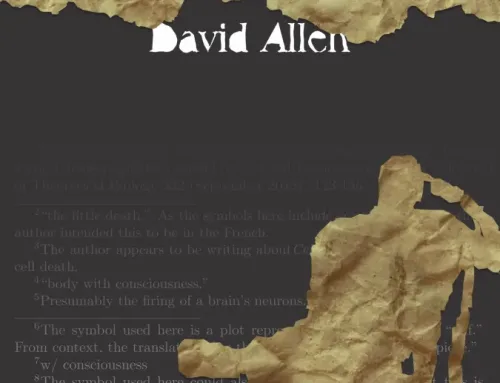Thunkle
1.
Of the brain power Simon Thunkle allotted self-reflection, the largest share went towards his pride. And, lest the reader be too quick to judge him for a lack of humility, there was also a portion of this energy that he spent on making sure that he continually operated in a way that would make this pride justified. He could think of no greater danger than acting in a way contrary to one’s given data set in a particular area, especially if this set was the result of introspection.
Our protagonist stood on the metro train, which departed Arènes for the center of town, at a time that would only allow him five minutes to find the address, which was scrawled in permanent ink on a tissue in his back pocket. He wore neither tie nor jacket over the green shirt which he had happened to also wear the day before. The lightness of the green, combined with a thinning of material (due to a disregard for more environmentally conscientious methods of drying his clothes), allowed each dark, curly hair on his chest to create a sort of micro-paisley pattern on an otherwise-would-be solid shirt. His pants, patterned herringbone in brown, had been purchased two days prior for this very interview. Simon had spent three hours in the store, examining every seam on every pair of slacks which he presumed to be his size. And, while the seams of the pair that he finally settled on had no earthly match, the size he presumed to be his, in fact, included an inseam two inches too short.
The biggest point of personal pride for Mr. Thunkle deserves mention. He had realized at a young age that it was impossible to estimate time for activities. When, as a boy, he would decide how much time he would give to a homework assignment, his allocated time would often either leave him with half-finished work or with a completed assignment and nothing to do. This random assigning of resources (under the guise of educated guess) was completely unacceptable. He was determined to act in accordance with pure honesty—recognizing the arbitrary nature of these guesses. So, with time, S. Thunkle had come to the opinion that the best solution was to first assign mental resources to a thought process (or action) before he actually had that thought (respectfully performed the task).
It was this philosophy which had led a well-fed Simon Thunkle (having taken the time that morning to not only make cinnamon rolls from scratch, fry seven eggs, but also to read every word in the morning’s newspaper in a language which he barely understood) to put on socks which his niece would have referred to as “mismachings,” under two shoes, only one of which was tied. Fortunately, a shoe untied still suffices in the locomoting of one to a certain 33 Place Wilson. After a successful metro ride and said locomotion, Mr. Thunkle stood four inches from the door marked by the same business name that was written in (purportedly) indelible ink, which now bled due to the sweat of his brow. The resources that he had randomly allocated to finding an appropriate swab for his head were still greater than those given to making his presence known. He stood in front of the closed door, without knocking, until it was opened from the other side by another would-be employee who had taken the time to match her socks. This happy egress allowed the receptionist to inquire, after seeing Mr. Thunkle deliberatively facilitate the exit of his competition, “Can I help you?”
2.
It was settled that Simon Thunkle would give considerable amounts of mental energy to the next question he would be asked in his interview for the position of English Language Director of Marketing. His interviewer was still tickled over Thunkle’s response to his very first question, “Did you find the office all right?” This first response, for the sake of time, should be summarized.
He recounted with some detail his first time taking the metro. He had assumed that a one-way ticket did not cover a change of metro lines, leading him to walk not to the nearest stop as indicated by his map (A-line) but rather to the closest station on the B line—a journey that would have only taken fifteen minutes, had he not one fully-filled full-size suitcase (55.2 lbs., but the airline let him through anyway), one half-filled full-size suitcase (only 17.3 lbs., presumably why there was forgiveness in the way of 5.2 pounds), and one backpack with nothing but computer cables. As it was, the trip to line B would have taken him thirty minutes, but he had allotted 4.24 hours for the journey. So, he stopped for dinner at a place advertising the best Indian food kabobs, which could have possibly been as good as advertised if he had taken the time to listen to the list of thirteen possible sauces and pick the correct, rather than the first (for he knew how to say “premier”), one. Being displeased with how late he arrived at his hotel, he resolved to pay the extra money and purchase two tickets the next time he required both metro lines. In enacting this plan, he finally learned that a change was, in fact, included, and, more importantly, he was left with an extra ticket, which he had used to make it to this very interview. After that, it was a simple matter of looking at numbers on buildings.
Perhaps it was because the interviewer was a man who empathized with the dry humor he assumed Mr. Thunkle responded with, or because it was an obviously ridiculous question to ask a man who was currently sitting in the office in question at the agreed upon time, or perhaps as a Frenchman he was prone to enjoy long, personal discussions over sundry happenings. Whichever was the case, if not all, he found this Mr. Thunkle to be a very enjoyable man to talk with, even considering his curt responses to questions which the interviewer found to be of importance. This is why, in asking his next question, “And do you have any questions for me,” he waited for S. Thunkle’s response (which we have already noted would be one of some detail) with anticipation.
Simon’s response regarded a matter very important to him, which might lead one to almost correctly assume he answered “Yes. What are your firm’s policies on resourcing?” In fact, this is effectively what he had asked the interviewer; only he took seven sentences to do so. His interviewer responded by saying that, upon receiving the specifics of a new product, the managers would meet to decide which project manager best fit the type of product. They would then create a project description which would allow them to resource other employees—putting together a team together with what they felt was a reasonable timeline. The laughter that this response brought to Thunkle heaved at his chest in a way that might make one worried about the top button of his shirt, whose thread (already tried by everyday wear) did not appear to be able to handle a prolonged laughing episode. Fortunately, it had been determined that he should only laugh for twelve seconds before responding.
“It is absurd. The notion that any individual, or any group of individuals, could contend to foresee the time required for such a project and, furthermore, that they could claim to know which persons would happen to be the best in seeing such a timeline through is absurd.”
The same internal mechanism responsible for retracting his head appeared to be also responsible for furrowing his ungainly eyebrows, pulling in the left side of his mouth, and shaking his head. He made a suggestion,
“Let me propose, if you will, a system that should be at least as effective while maintaining intellectual honesty.” Still manifesting a remnant of his head shake, he continued, “… I suggest that you first create your teams, giving them timelines before the projects come in. Then there is no time wasted between receiving a project and giving it to a pre-determined team…”
We truncate his response there, for while the interviewer continued to listen in earnest interest to the fifteen minutes that followed, they added very little in the way of content.
3.
Mr. Simon Thunkle had been hired instead of the lady who had taken too much time to match her socks. His ensuing success as English Language Director of Marketing might be best understood under the light shed by his successes in college. For this reason, we digress.
Simon was accepted into the graphic design program at the only university whose application he had fully filled out. Other students viewed what they assumed to be an eclectic sense of style, together with Simon’s obvious self-assuredness, as a reason to look up to him. His second day in his freshmen course in psychology serves as a sufficient example of this. Simon sat in the back of the classroom wearing an orange winter coat in June, which would have made him very uncomfortable had he given any time to the consideration of his discomfort. Instead, he listened to the naïve teacher assert the importance of learning from your classmates and how, armed with this philosophy, they would teach each other the first chapter. This, of course, was a wonderful way to learn—if only the rest of your classmates had all received degrees in psychology, making them qualified to impart the first chapter’s knowledge on Simon. He laughed to himself at this notion and proceeded to take great care in imagining a world where famous American presidents drove cabs and dolphins produced great films.
It must have been the combination of Simon’s attire and the way his chuckle made the down coat expand and contract, like orange bellows stoking the fire of Simon’s incredulity, which made the student, two desks to Simon’s left, decide him an easy target. That day, having almost no time for breakfast, Simon had quickly poured the coffee (which he had taken the time to cold brew) into the thermos his mother had bought him two Christmases prior. And, as was the custom of Mrs. Thunkle, she had his nickname “Thunk” engraved on the gift (above the brand name “Bean”). It was this very chink in Thunk’s social armor that the attacker decided to strike.
“Aww… that’s cute! Lemme guess, your nickname is ‘Thunk.’ Did your mommy buy that thermos for you, Thunk?”
In fact, she had.
“… Did she make her very special boy a nice pot of coffee to start his day?”
She had not.
This social outing may have caused any other freshman to retreat into their giant coat, but this was not so for our Simon J. Thunkle. It has been mentioned how important operating according to one’s data set was to Simon–a fact which, at this point, deserves repeating. For, as the assailant flung his verbal arrows, Thunk could not help but wonder how he knew his nickname was “Thunk” instead of “Bean.” There were two names on his thermos; guessing the right one was a one-in-two probability. Going forward with such a guess did not seem intellectually responsible. With one-to-one odds, he should have said, “Your nickname is either Thunk or Bean.” Curious as to whether he was missing some piece of information which his antagonist had secretly acquired, our hero retorted the logical question,
“How do you know my nickname isn’t ‘Bean’?”
Thunk gave time to remembering that, in high school, it was only the popular kids who were so bold as to make assumptions based on such horrible odds. Evaluating his own data set led Thunkle to the hypothesis that his attacker must have been such a kid in high school. Of course, as it would have been careless for him not to check his assumption against truth (he was no longer in high school, after all), Thunk followed with the innocent question,
“Wait, were you a cool kid in high school?”
This would lead to three curiosities for Simon. First, why would such an innocuous question lead the other students to point at his interlocutor and start laughing? Secondly, why did the other student not answer either of his questions? (He was, after all, the one who started the conversation.) And, finally, why did this make students want to hang out with him after class?
4.
Simon Thunkle not only saw social success during his time in college, but he was also highly regarded academically, particularly in those areas that pertained to his major. His senior year design professor would write in a letter of recommendation that,
“Simon Thunkle has consistently shown himself to be extremely adaptable as a graphic artist. While other students seem to choose a personal style and develop it, showing too little variance, Simon stands out. He has exhibited a unique ability to take very intricate concepts or projects and distill them into very basic designs with very few details. At other times, he has proved himself able to take simple projects and extract from their descriptions great details which manifest themselves in his work. For instance, in asking the students to design a logo for a social media platform, most of the students presented colored squares with simple shapes cut out, while Simon Thunkle submitted a precisely detailed oil painting of a bird on a 10’x10’ canvas.
His careful attention to projects’ descriptions will make him a valuable asset to your company if you choose to give him this internship.”
On being asked to produce a movie poster for a popular film about a certain quadruped who gave a certain biped reason to live again, Thunk submitted an imprecisely digitally sketched picture of a horse under the word “watch.” The teacher would declare this a bold statement that “perfectly resonates with the film’s message that, despite all odds, an imperfect creature can rise above their own imperfection and give another such imperfect creature,” in this case a dying girl, “hope;” and would admire Thunkle’s project further by saying that one needed only to “watch” the film to see that “this creature, so poorly depicted on the poster, would, in fact, prove to be beautiful only through its actions.” That was to say, it was an inspiring film about a horse.
Such accolade led Simon J. Thunkle to be given an internship as a graphic artist in an advertising firm, which he knew to be well-deserved, for success in physical action, which was the direct byproduct of personal philosophy, was the purest form of success. After that, he had an auspicious interview for the “Advertising Director” position at a small company that produced hybrid spray bottles/fans. These were not ordinary spray-bottle/fans–the fan blades utilized the same technology used to reduce turbulence at the tip of airplanes’ wings, which, naturally, kept one even cooler on a hot day. This eventually contributed to him acquiring his current position, in which he was highly regarded as a man who always worked hard, even if not for long.
5.
Perhaps if Thunkle had not chosen his current field and had, say, for instance, chosen construction in its stead, he might have been, at this moment, staring at the confused faces of construction workers who might insist that “no, we cannot just choose how long it takes for concrete to set” or “no, we cannot just pour the concrete before it gets delivered. That is called water.” Thunkle had not chosen construction, however, and was currently staring at faces showing surprise at the fact that he would call a meeting to discuss the development of his team’s current project. What impressed his boss the most about this particular meeting was getting the response “we have yet to receive a product description” to Thunkle’s question “why do you have yet to begin the project you were given,” Simon settled for nothing other than progress.
“Man,” he began his response, “can do no better than to move forward in a manner which best utilizes the current information he has at hand.”
As this is something with which very few people would disagree, it began a sequence of nods through the meeting room.
“Furthermore, there is nothing more admirable than a person pushing forward despite a limited data set; for, is this not what has forwarded progress throughout our great history?”
At his inflammatory rhetorical, Thunkle began the motion of slamming his fist to the room’s table but stopped four inches before his hand made contact.
The next day, after calling another such progress meeting, he would enter the room with just enough time to say, “splendid,” before leaving. It was of little shame that there was no time for him to actually view the poster that his team had prepared after the previous day’s lecture, for, in fact, it was simply the word “product,” in white, on a matte black background.
Such progress was, of course, a direct result of Thunkle’s personal credo. So, it was Simon J. Thunkle who was chosen to spend six months helping set up the firm’s soon-to-be Eastern Europe office, and it was Simon J. Thunkle who was promoted to Regional English Language Director of Marketing. Upon hearing this news from his boss, Thunk jumped to his feet, said “thank you,” and went back to work, this time humming. Humming was an efficient way for Simon could celebrate small, personal victories in his life. And, if the reader errantly believes the victory in this case to be promotion, it should be stated that the reason for this particular victorious crooning was that the meeting with his boss had taken precisely the time he had allotted it—four minutes and fifteen seconds.
6.
Thunkle looked at the train schedule and compiled a set of data on which he would soon act. With only one full-size suitcase (75% full, 82% zipped), he would take the eastbound train, which was set to depart at 19h00. As it happened, researching the correct train was given considerable time and mental faculty the week before. Tweaking departure times, changing arrival times, and allowing for different numbers of stops enabled our hero to find this particular voyage at half the price of any other. What was more, in what must have been gross oversight on the part of the railway, it was cheaper for Simon to book a first-class ticket than a regular one.
As the 19h00 train came to a stop on the eastbound tracks, Simon J. Thunkle took a step in its direction.
Perhaps it was that Simon gave no resource to his aural faculties at that particular moment. Perhaps it was that he double-booked the time required to look at the train schedule with the time needed to walk to the train. Or, perhaps, it was that in all the time he had spent worrying about whether or not he was making the best decisions based on the information he had at hand, he had never given time to the evaluation of those sets of information; he had not once concluded that there was not enough data. Whatever the reason, Simon Thunkle’s first step landed him on the neighboring westbound tracks, which were, at that moment, host to an express train to the coast.




Leave A Comment
You must be logged in to post a comment.